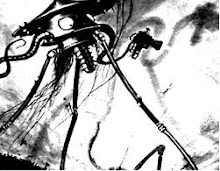Muxtape Reimagined
The most interesting thing about Justin Ouellette's revealing post regarding the RIAA's take down of Muxtape is how the RIAA acted independently of the labels that the organization represents.
Over the next week I learned a little more, mainly that the RIAA moves quite autonomously from their label parents and that the understanding I had with them didn’t necessarily carry over.As Ouellete points out, the labels understood the inherent value of Muxtape -- viral marketing and mouth-to-mouth promotion of music, which creates a consumer generated community organized in a central location on the internet. The fact that the RIAA moved autonomously of the labels signifies that the organization does not understand the cultural value its content has for consumers, and instead views this content as nothing more than "product."
This fundamental misunderstanding is also evident in their ongoing anti-piracy campaign against 12-year-old kids and grandmothers. Not only is such a campaign doomed to failure, but the industry is targeting its best costumers. The only such case to go to trial, Capitol Records v. Jammie Thomas, awarded damages of $222,000 to record labels. Thomas had shared 24 songs on Kazaa, a once popular peer-to-peer network. The ruling has been challenged, the punishment criticized as unfair, and the judge in the case has expressed doubts about the court's decision. The really interesting part about this case is the RIAA's efforts to solidify "attempted copyright infringement" into law. The RIAA doesn't understand that the "product" is much more than a cut of wax, a wound up analog tape, a plastic disc, or a series of digital bits to fans.
The emotional connection that people have with music goes back far in history, before copyright law and "intellectual property." Music transcends boundaries in ways that other mediums cannot. People have "played" with their culture continually throughout human history -- through sharing, modifying, or creating new works from existing works. The recent extension of copyright term limits has cut off people from these previously exercised abilities just at the same time that technology makes it easier to do so.
Muxtape served this emotional purpose well -- music fans were able to share their favorite songs to any interested party like never before. And on the business side of things, Muxtape provided the best possible form of promotion -- mouth-to-mouth advertising. People are more likely to make a purchased based on the recommendation of a real person, friend or stranger, than from record label advertisements on glossy magazine pages. All that potential, wasted. As I have said before, the RIAA is only hurting their own industry with these actions.
I think Muxtape will demonstrate the positives of sharing music through its new focus on the band feature. I find it unfortunate that Ouellette didn't try to reach out to independent labels exclusively and strike licensing deals while also barring major label participation. I think that such an action could have the effect of showing major labels that repressing people's natural desire to share will only hurt their businesses, while also helping out smaller labels experience more recognition and (hopefully) increased sales for their artists. (I'm confident that sales would increase; however, there's little solid data surrounding this issue. This could have been a great test case.) Perhaps this will occur anyway through the band feature. Only time will tell.



3 comments:
All very intriguing. Have you corresponded with Oullette?
Interesting idea... I decided to send Justin an email. Here it is:
-------------------------------------
From: illegal youth
Date: Mon, Sep 29, 2008 at 3:15 PM
Subject: Question about Muxtape's Relaunch -- Independent Labels
To: justin[at]muxtape[dot]com
Justin,
Have you considered approaching independent labels for licensing deals? You wrote:
The second was to ban major label content entirely, which might have solved the immediate crisis, but had two strong points against it. The first, most visibly, was that it would prevent people from using the majority of available music in their mixes. The second was that it did nothing to address the deeper questions surrounding ownership and usage for everyone else who wasn't a major label: mid-size labels and independent artists who have just as fundamental a right to address how their content is used as a large corporation, even if they don't carry quite as big a stick.
The first point is largely irrelevant now, considering that the RIAA has prevented major label content in its entirety since the take down notice was sent to Amazon. I understand the concern of the second point, which is why I ask if you have considered licensing deals with independent labels. I realize that there are more independent labels than majors, and thus, it could be more work to include independent labels. And there's also the lack of organization between independent labels. But I think with some organization of information to users (i.e., a list of licensed labels, etc.), it could be possible to slowly add new labels yourself, or you can encourage labels to "apply" (for lack of a better term) to Muxtape for a licensing agreement.
It seems that the independent labels are more likely to be receptive without encroaching on editorial control, so this could be a way to continue the old Muxtape while not avoiding questions surrounding ownership and usage.
-illegal youth
http://illegalyouth.blogspot.com/
-------------------------------------
I'll update if I get a reply.
I like the solution offered here. Could be alot of work, perhaps worth it, if users pitch in...
Post a Comment